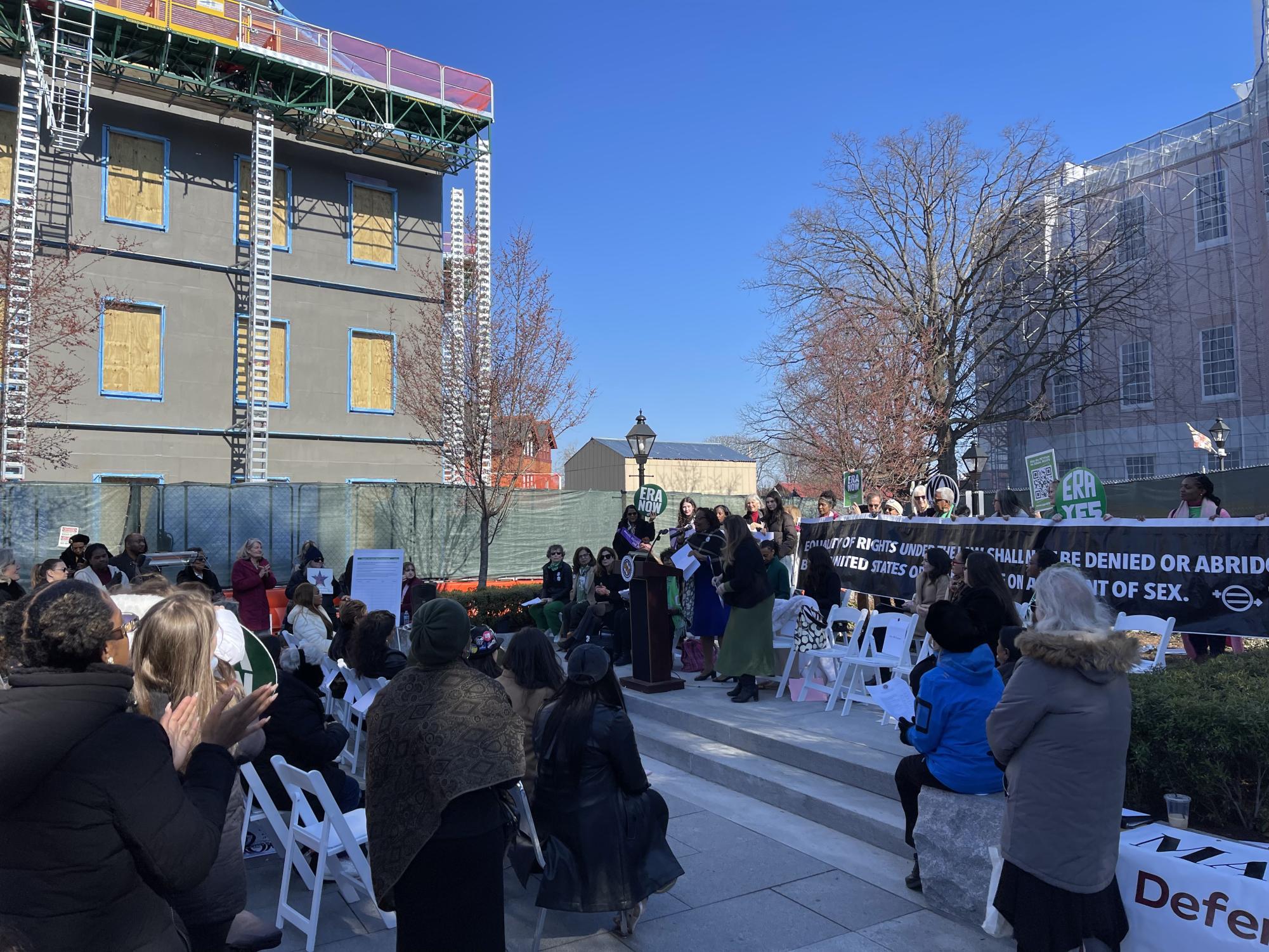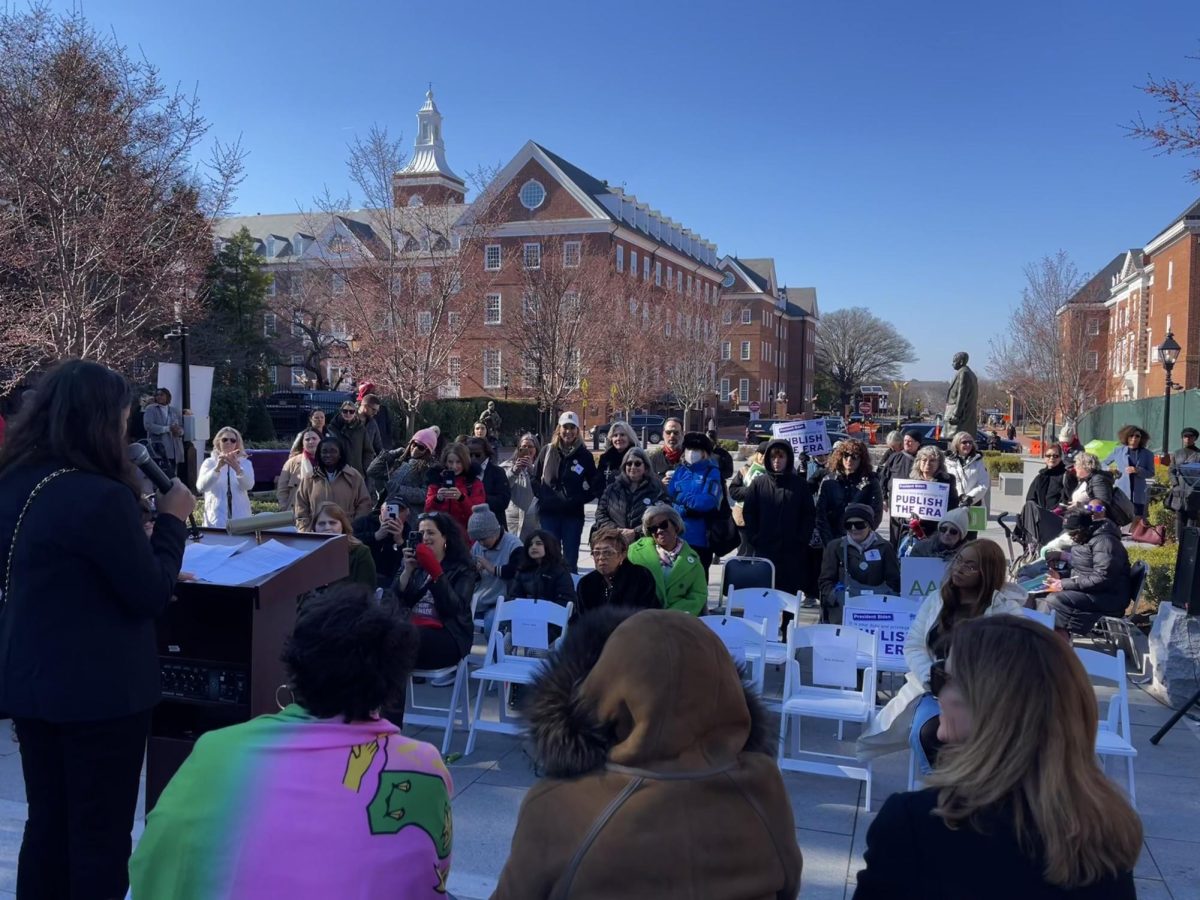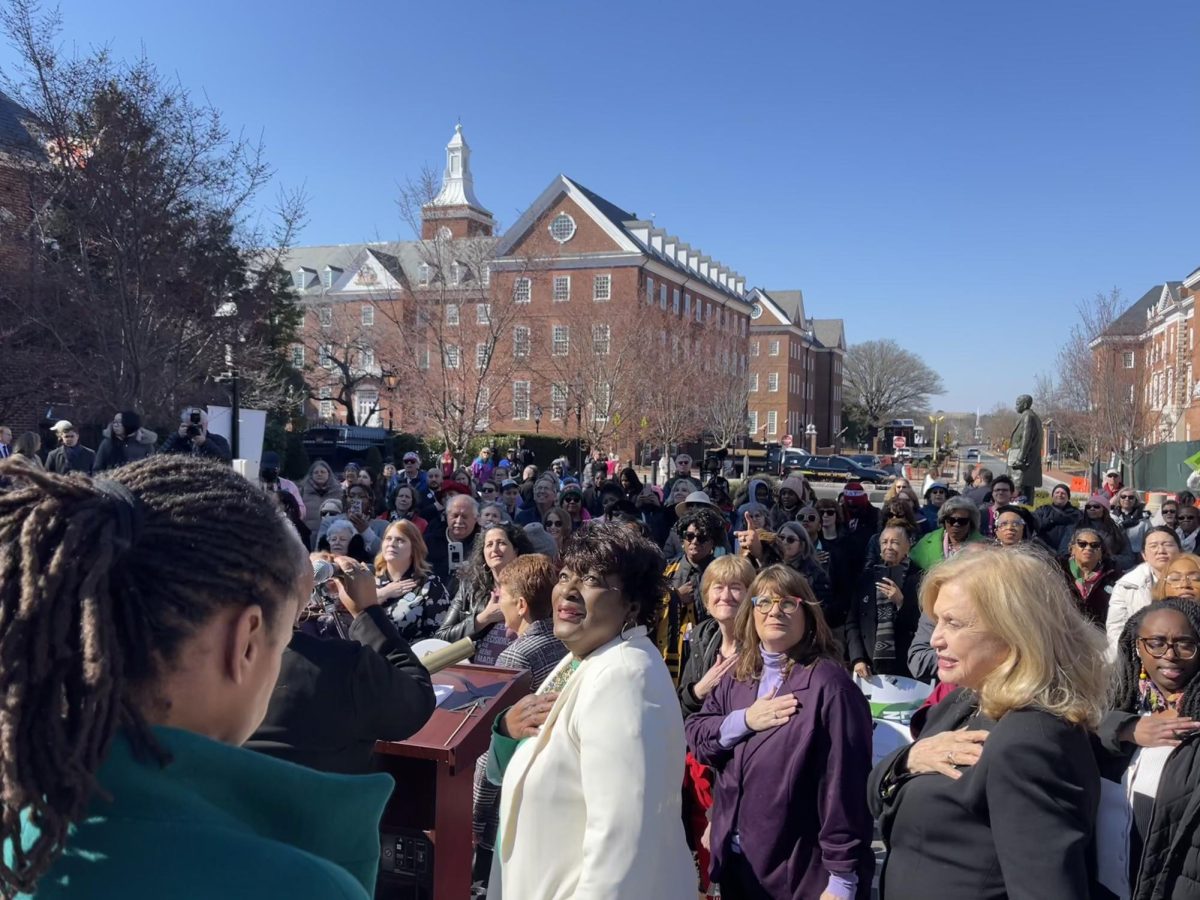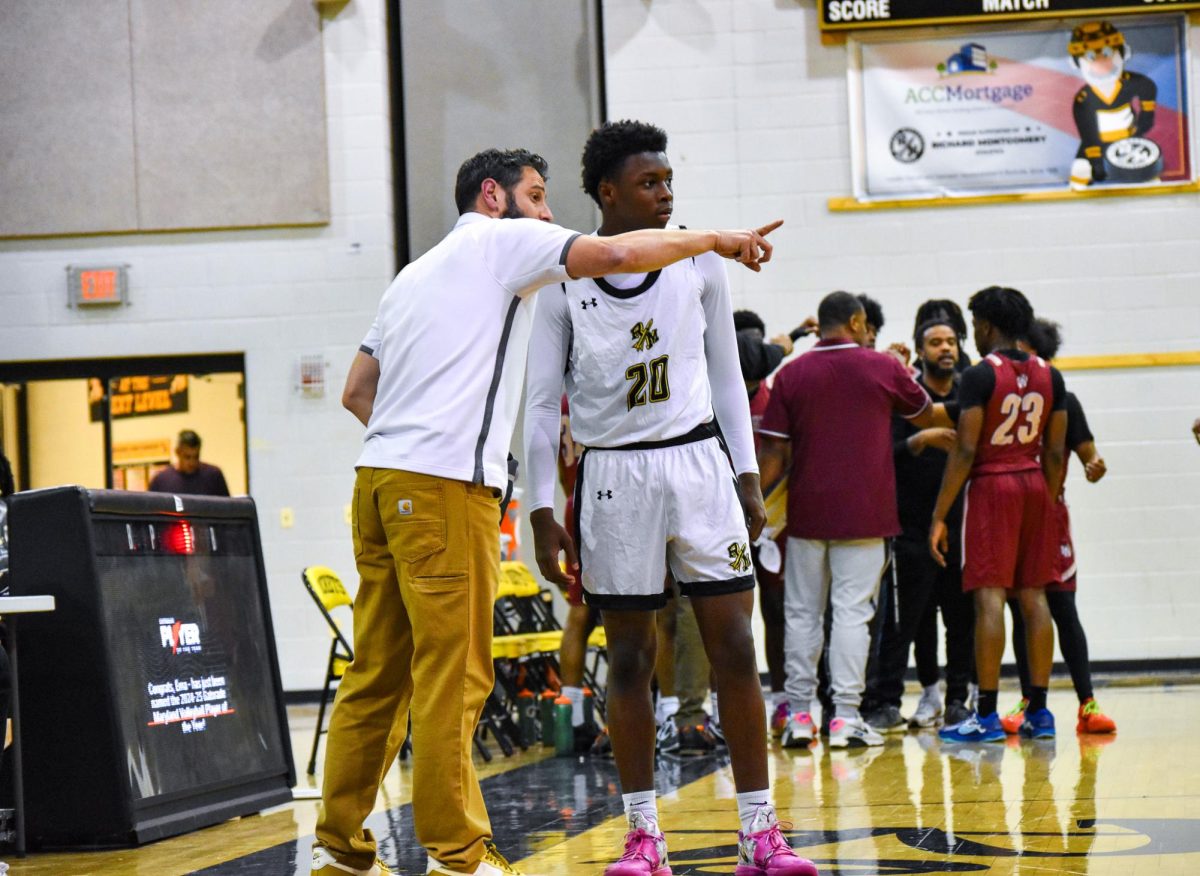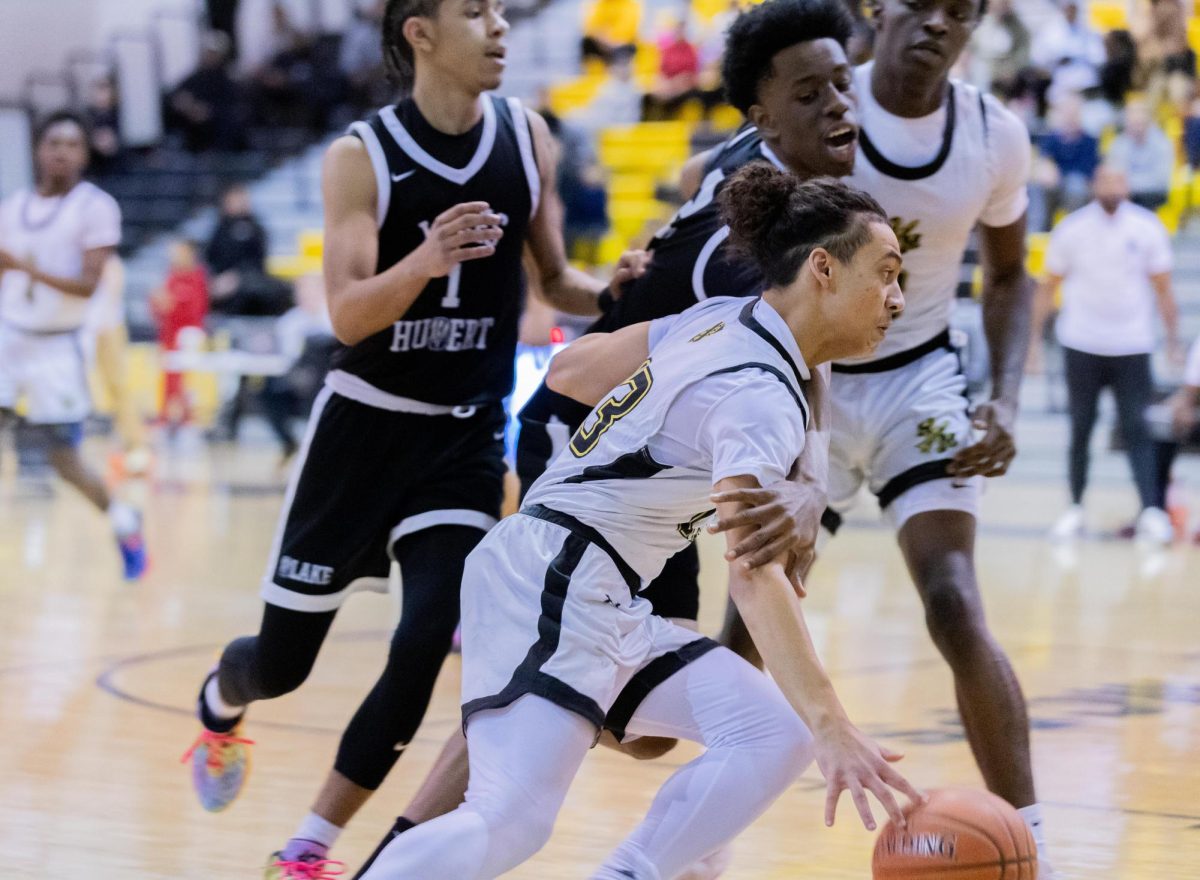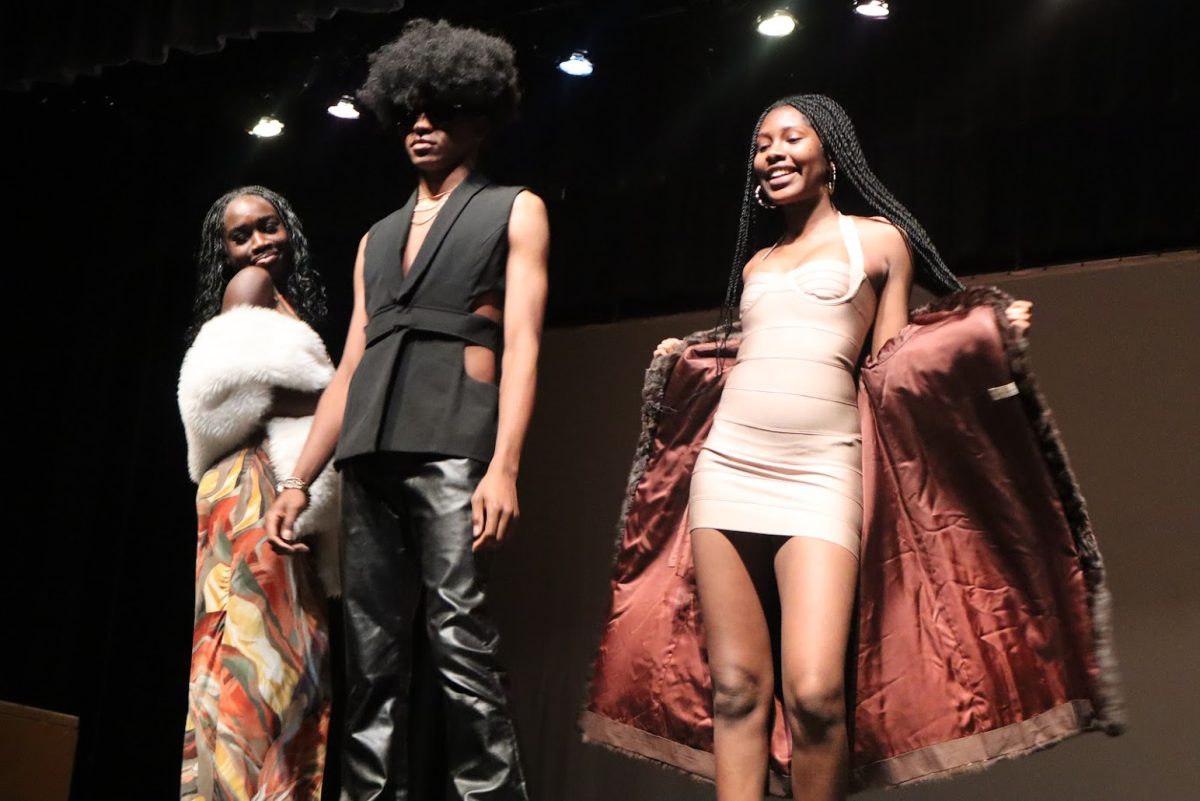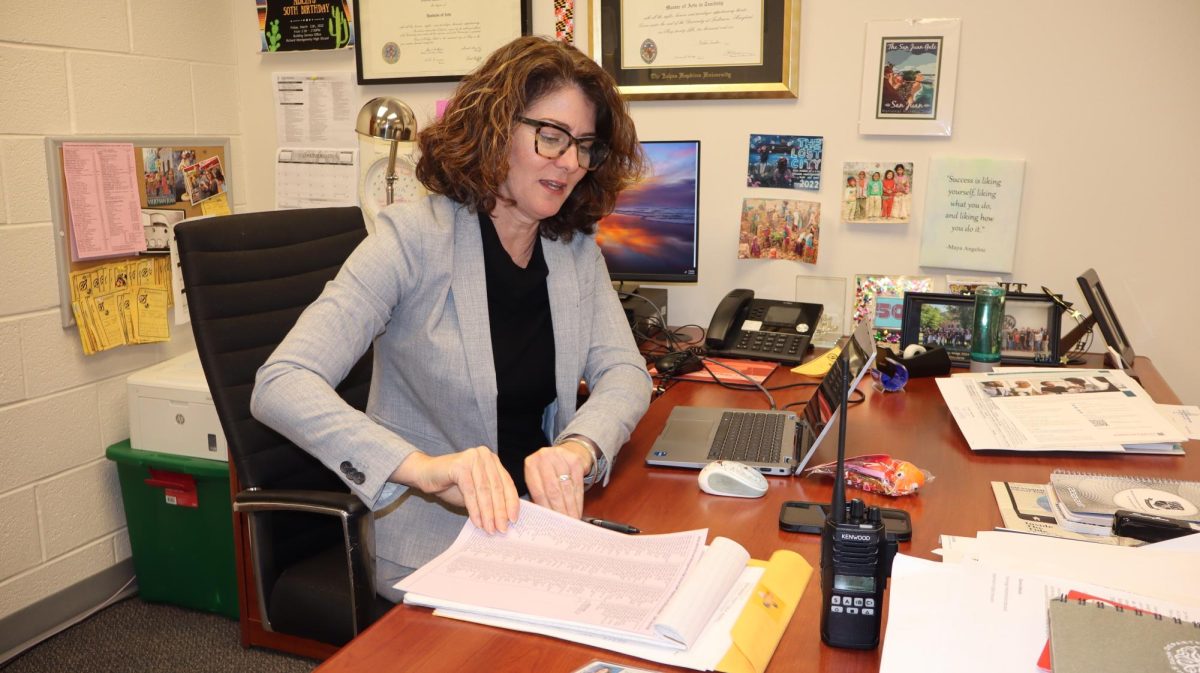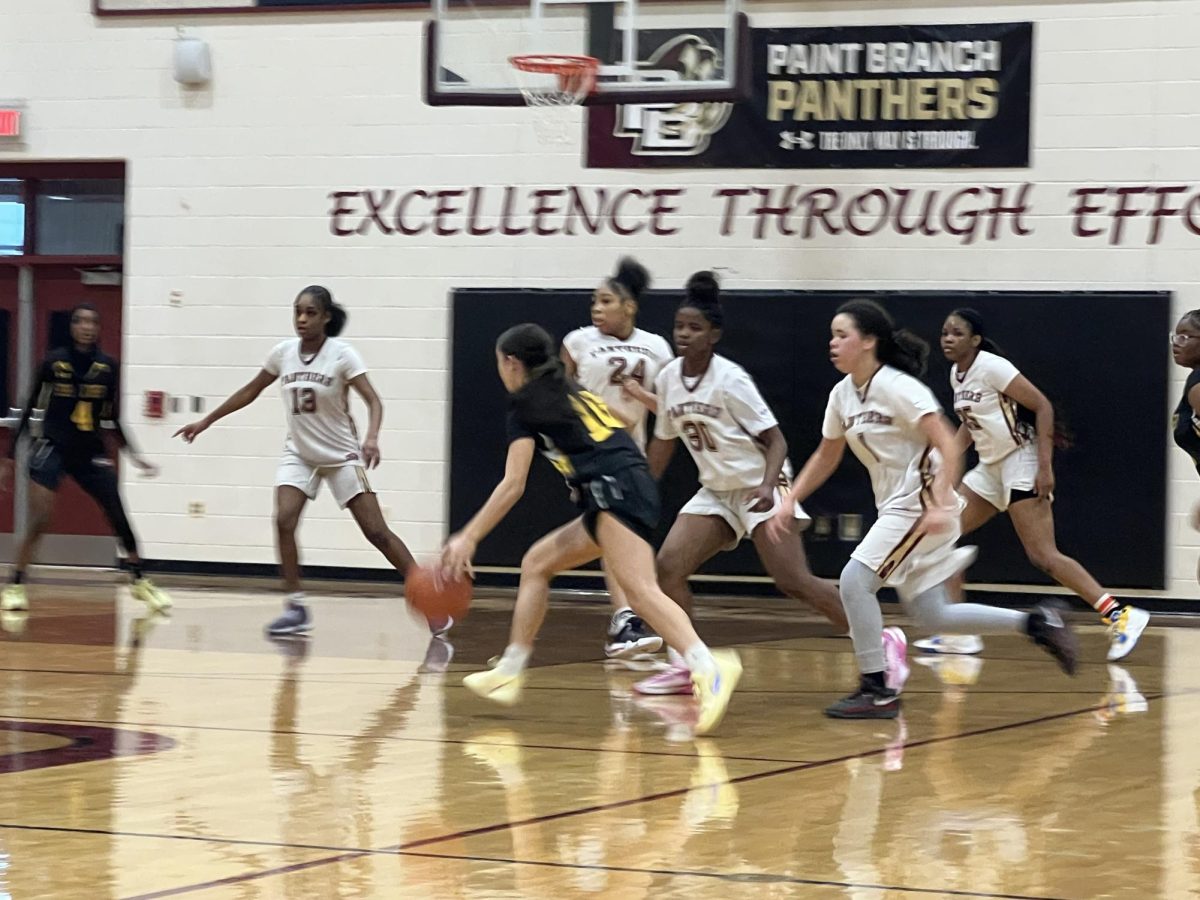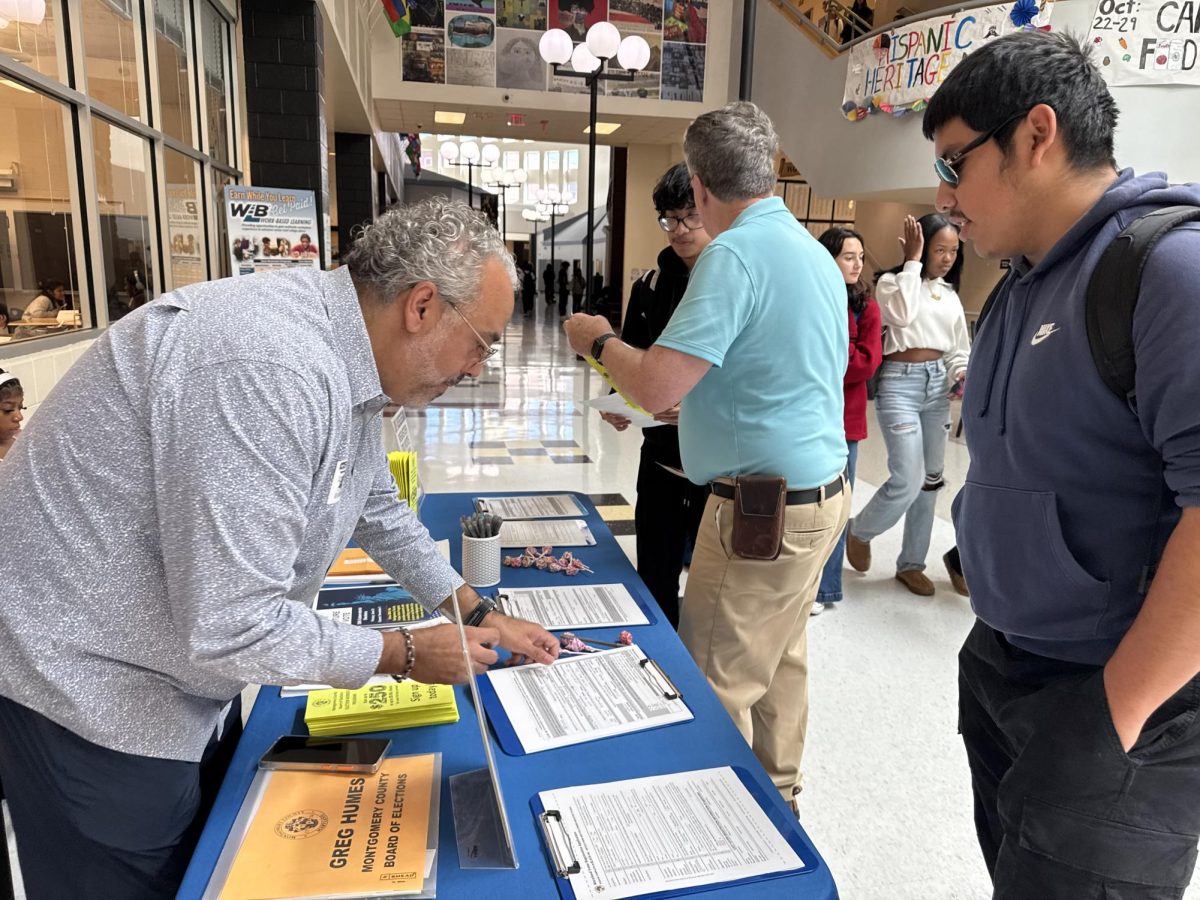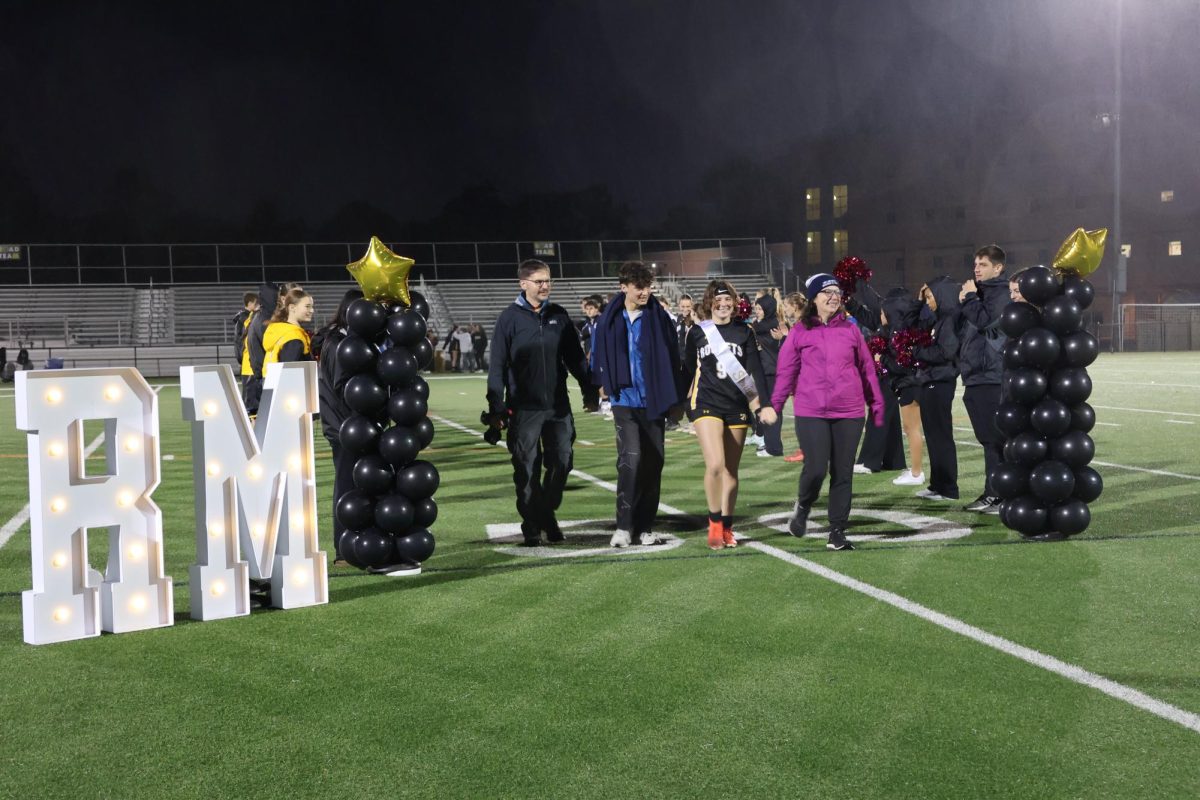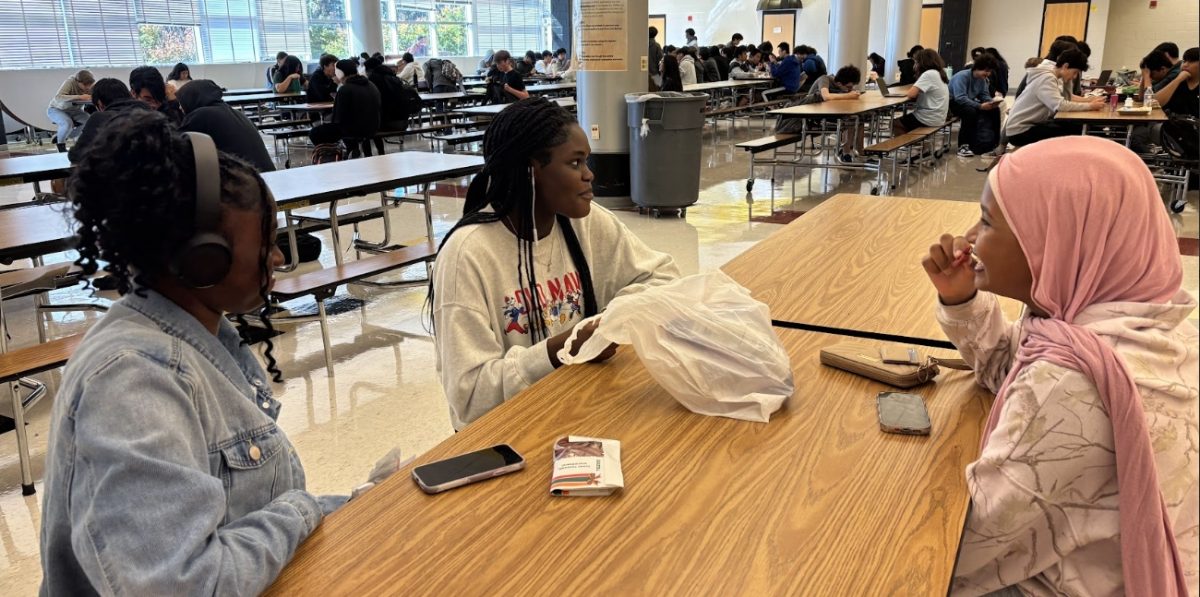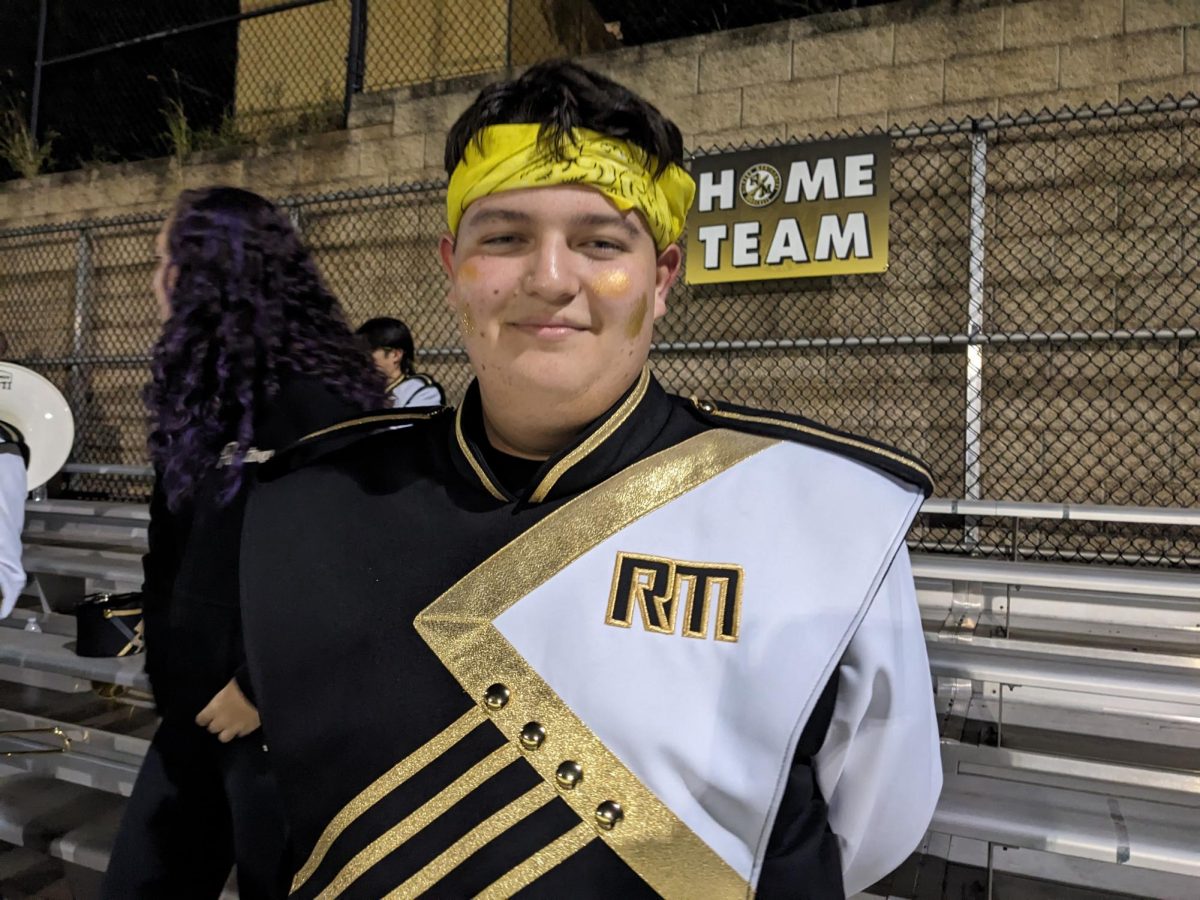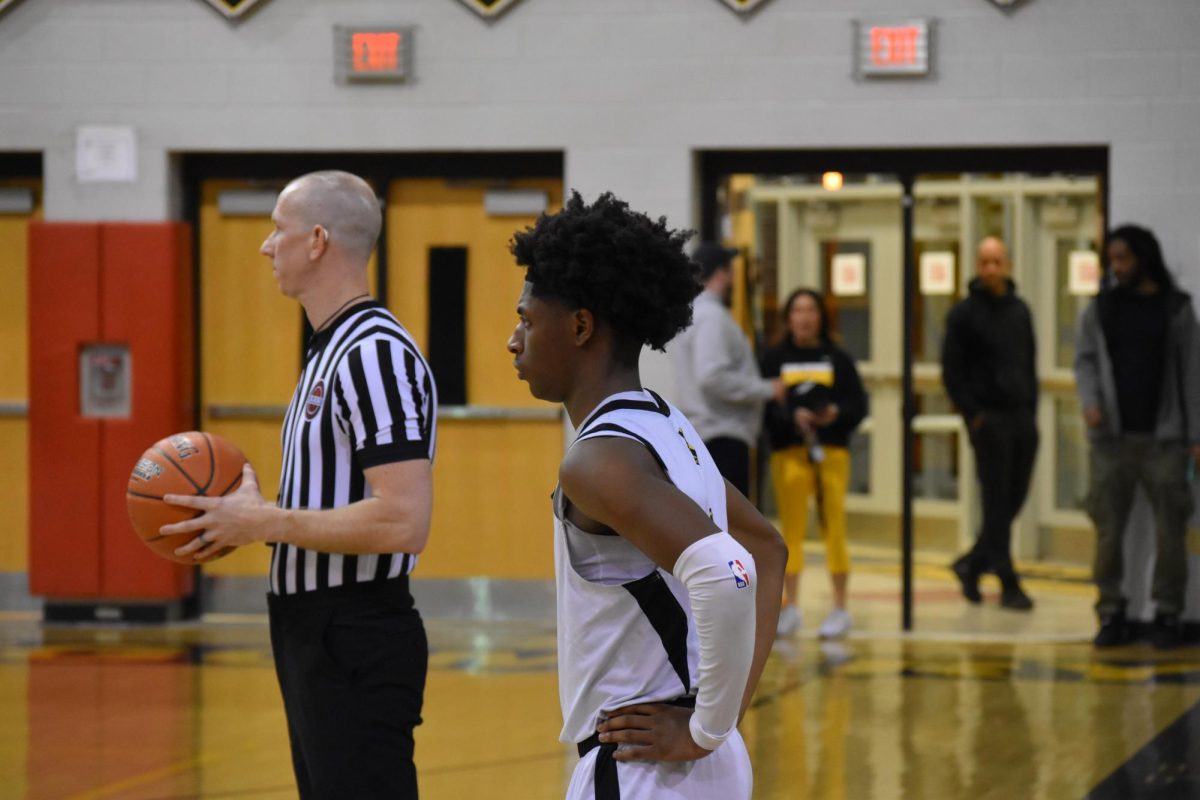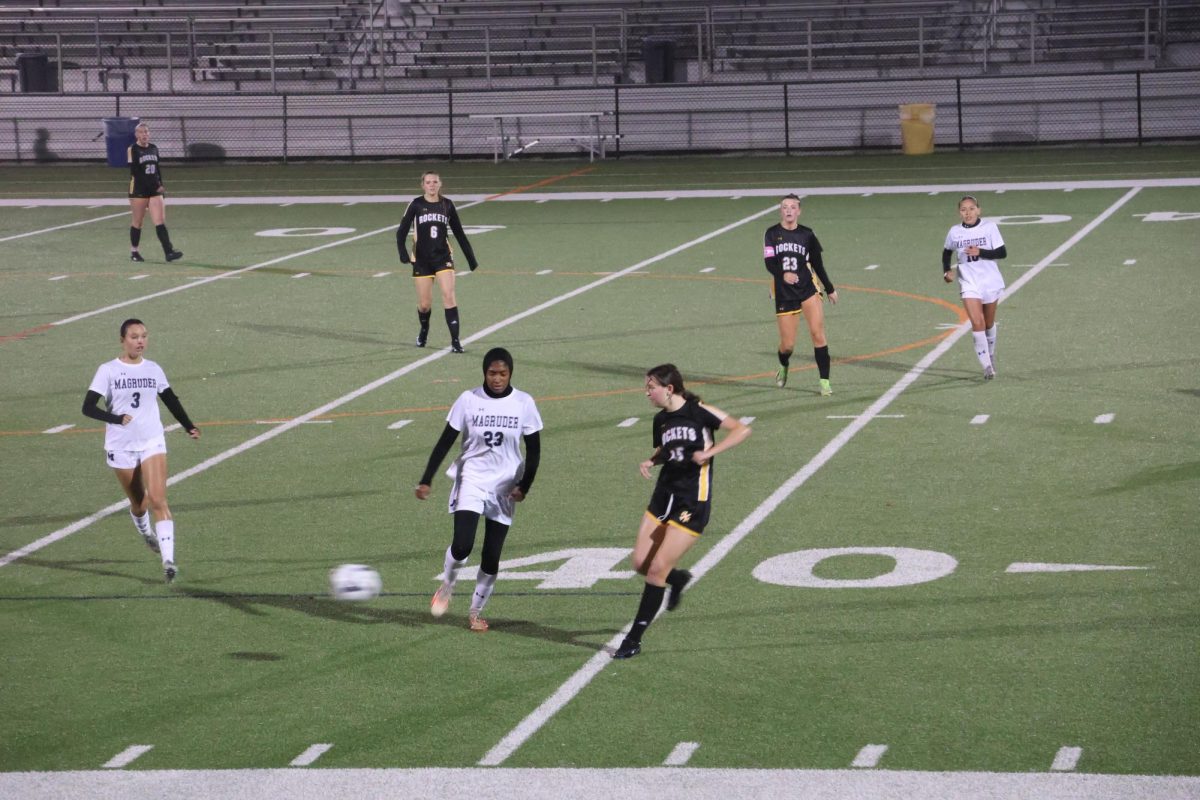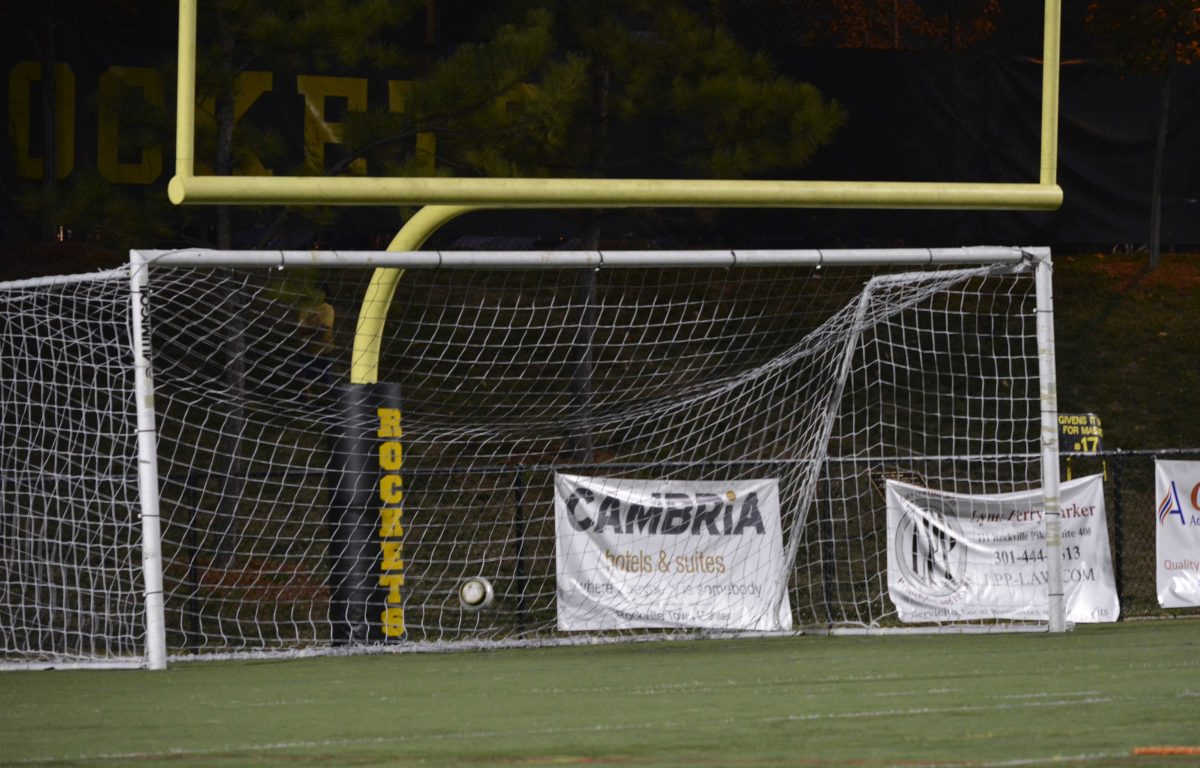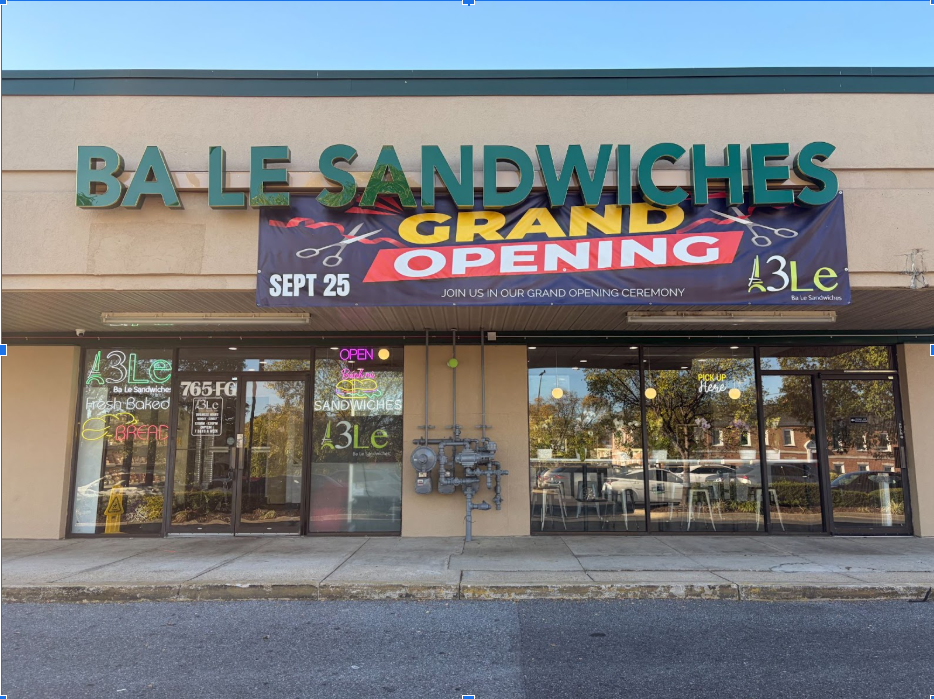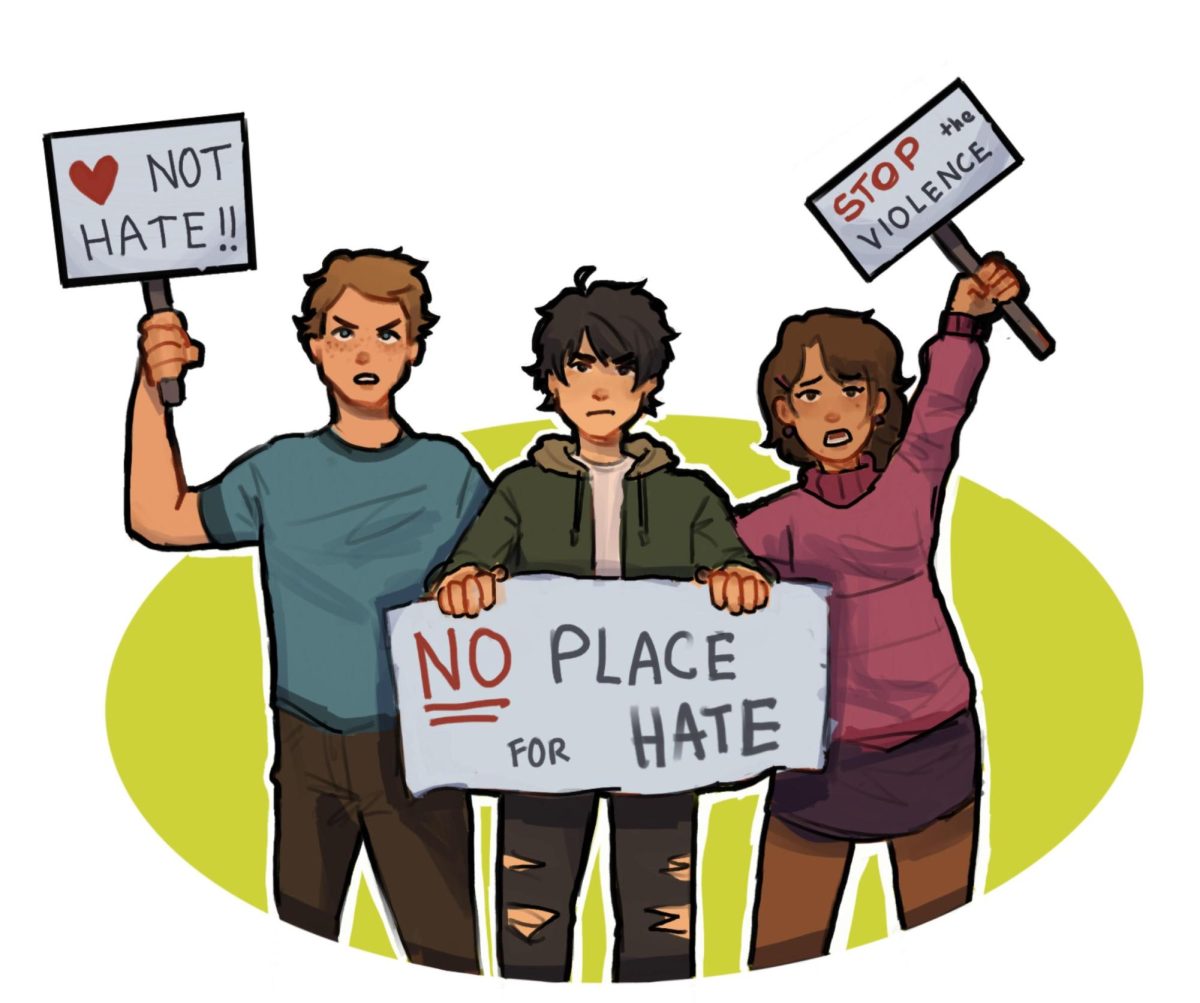Photo Essay: Maryland Rally for the Equal Rights Amendment
The Equal Rights Amendment (ERA), first introduced in 1923, aims to amend the United States Constitution to prohibit discrimination based on sex. It ensures “equality of rights under the law” for all individuals, regardless of gender. Despite its lengthy and contentious history, the ERA has faced significant opposition and public scrutiny.
Despite facing obstacles, the ERA achieved a significant milestone on January 27, 2020, when Virginia ratified it. This fulfilled the constitutional requirements outlined in Article V, which demand approval from two-thirds of Congress and ratification by three-fourths of the states. This action seemed to solidify the ERA’s position as the 28th Amendment to the Constitution.
However, it has not yet been added to the Constitution. Numerous legal and procedural concerns have emerged regarding the ERA’s ratification process. Questions about the time limit for state ratifications and the withdrawal of prior ratifications by certain states have cast uncertainty over its official status. Differing views among constitutional experts persist, with some contending that it’s already added to the Constitution, while others argue that further steps are required.
The ERA holds significant meaning for those who support gender equality. Regardless of the outcome, the ERA’s journey serves as a powerful reminder of the ongoing fight for equality and the complexities involved in amending the Constitution.

On February 19, 2024, a rally was held in Annapolis, Maryland in support of the Equal Rights Amendment. Numerous state and local legislators showed up to the rally to relay their thoughts on what would be the 28th amendment in the U.S. Constitution if affirmed.
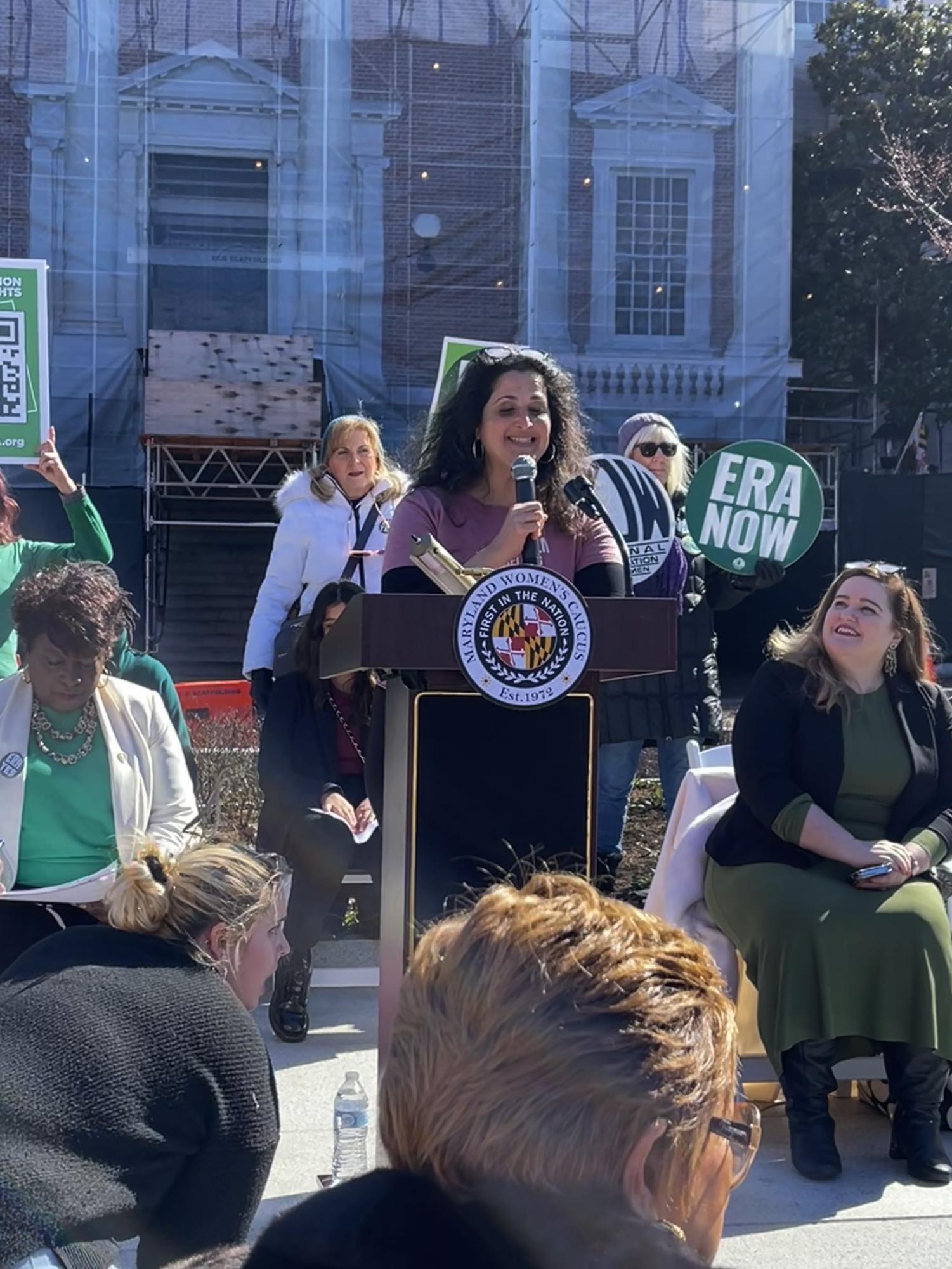
Veronica Cool serves as the Vice Chair of the Women Legislators of Maryland Foundation. “Did you guys know that the United States is ranked the 10th most dangerous country in the world for women? I worry for my daughters. I worry for my friends, for the next generation. Their rights are being taken away, and their body is not their own,” Cool said. Much of the push for the ERA to be affirmed in the Constitution comes from the overruling of abortion rights in the 1973 Roe V. Wade decision, as well as the ongoing fight for equal pay. “As a Latina, I want you to know that we make $.57 on the dollar compared to a Caucasian male. it would take me 40 years to catch up for doing the same work,” Cool said.
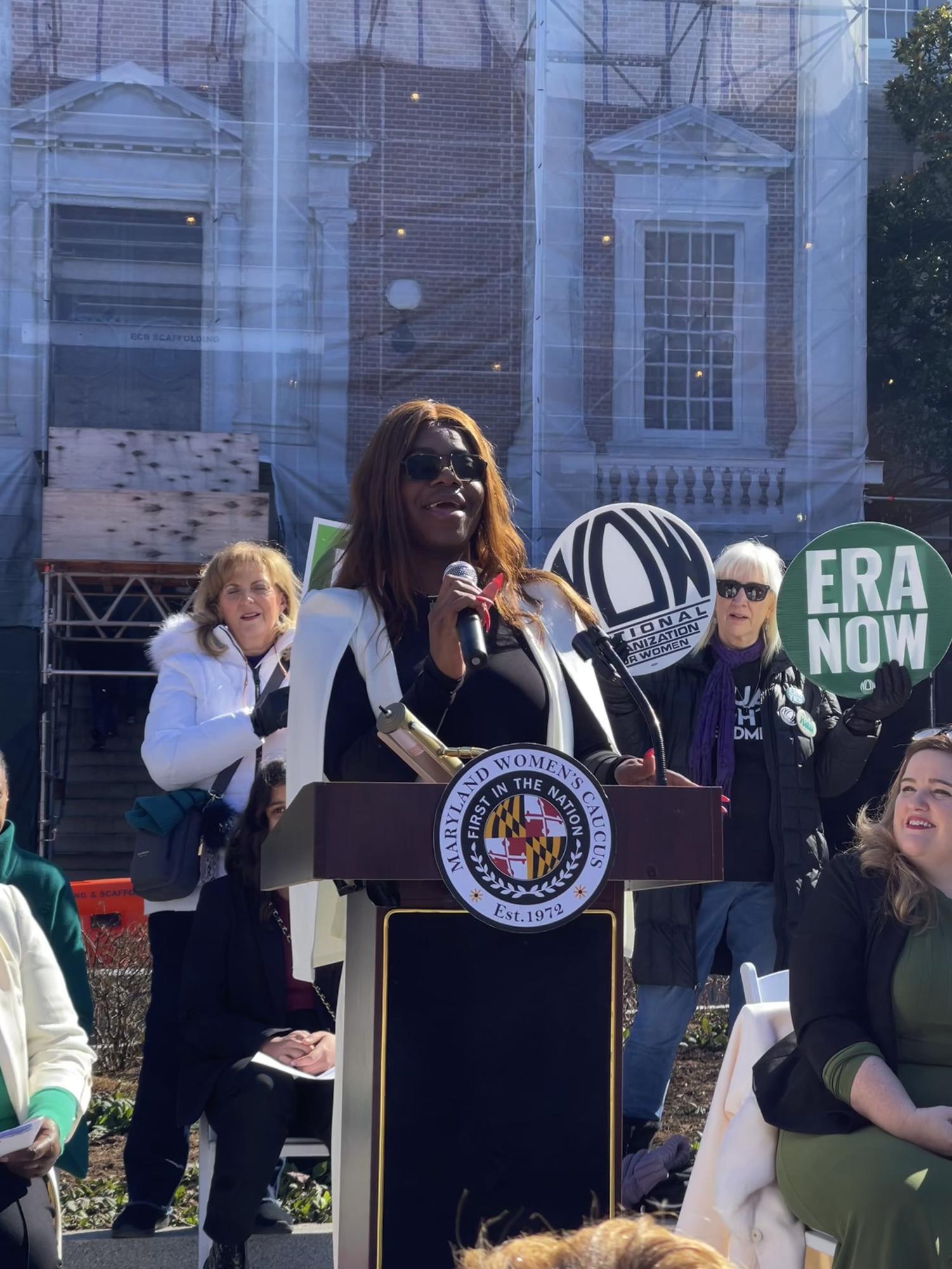
Michelle Ngwafon, representing U.S. Representative David Trone, shared a personal story of her grandmother’s struggles as a single mother to three young girls. Her grandmother had only a 2nd grade education, but was able to raise her children and then 10 grandchildren. She and her family brought hundreds of people from Cameroon to the United States for a better life. “I think when we talk about the ERA, we think about women like my grandmother, here or abroad, who were thought of as good for nothing more than marriage…When you write a constitution that only values land owning white men, you can’t simply add a little bill here and there when people get riled up. Nothing will be enough until it [the ERA] is in the constitution,” Ngwafon said.
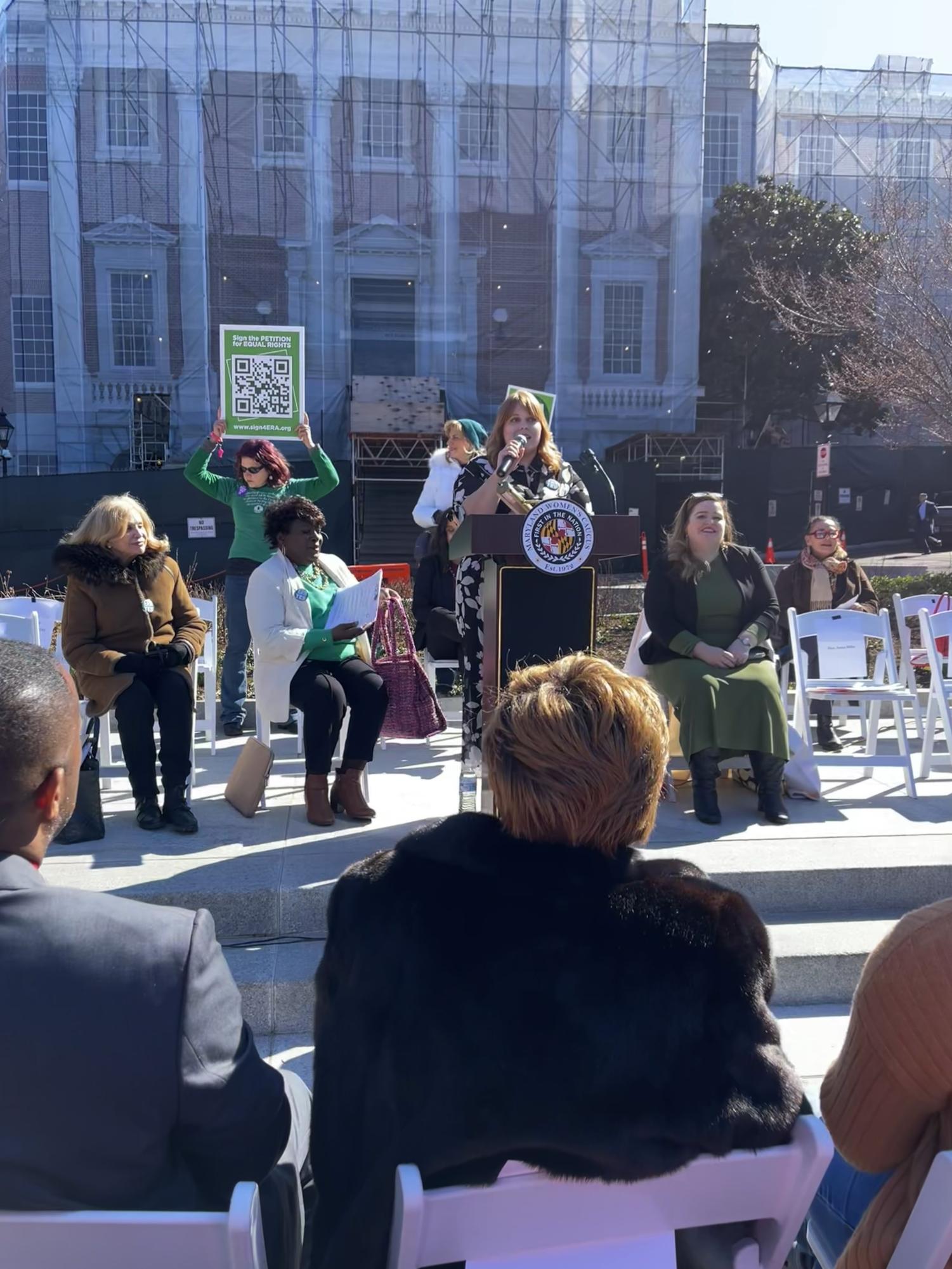
The Chair of the Young Democrats of Maryland, Megan Outten, praised the younger generations of America for refusing to be silenced, and pushing for the fight for equality to be a multi-generational movement. “Our struggle is woven into the very fabric of American history, and so, as we raise our voices in unison today, let us remember why we stand here. Let us remember the countless women who came before us, and the countless more who will come and follow in our footsteps,” Outten said. She reminded the crowd that the ERA is a beacon of hope, a promise for a more equitable future for generations to come. “The echoes of gender disparity sound loudly still today.. Today we rally not just for ourselves, but for our sisters and our mothers, and for all the women who come before us, and after us. It is time we show the world our strength,” Outten said.
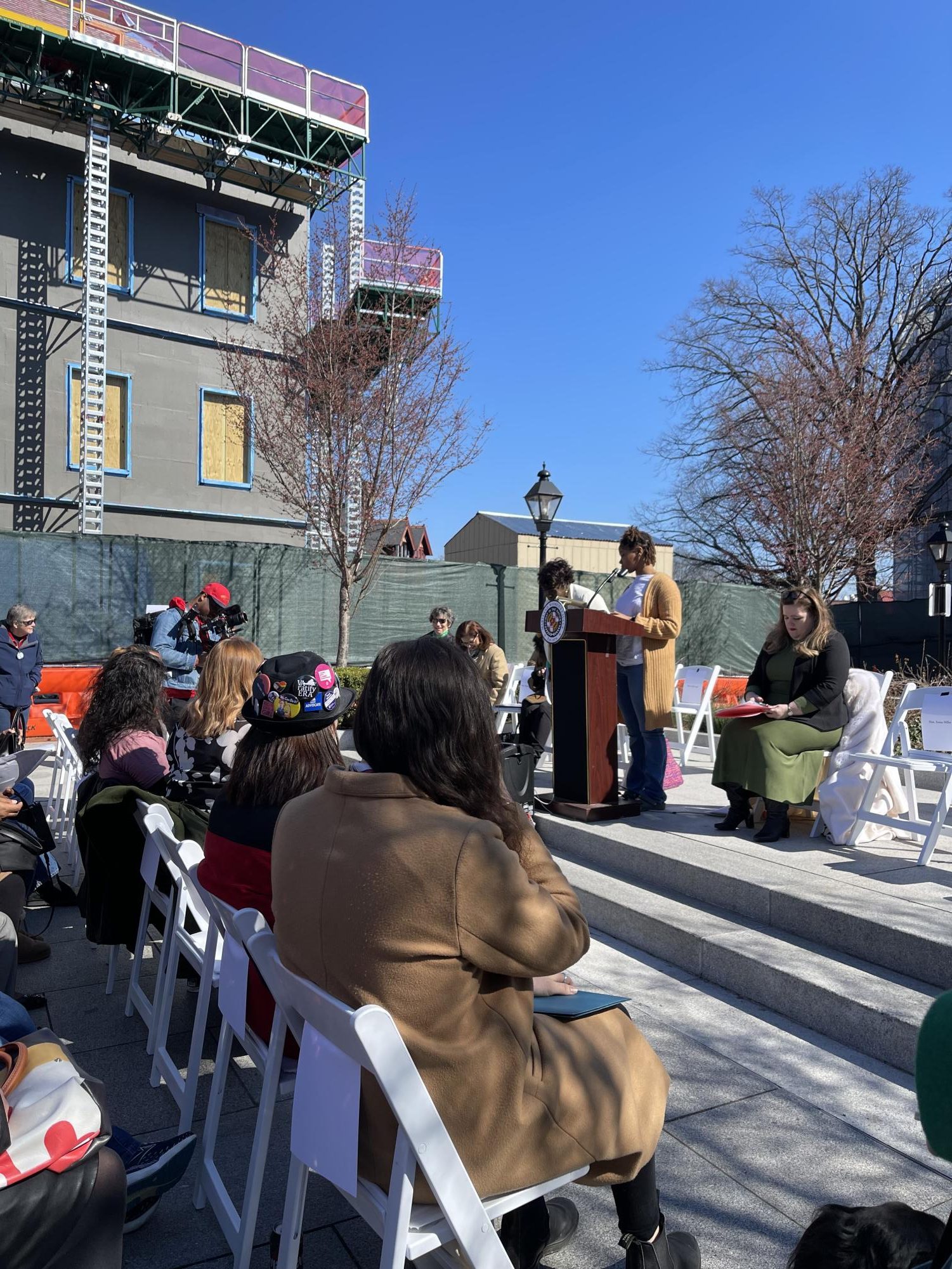
Kalese Slade, a student from Annapolis High School, read two poems that she wrote herself. Her first, “Size 8” revealed her feelings as a woman of color of not feeling heard and understood by others, and being under appreciated. The second poem, “Approval”, delved into her feelings of needing approval from those around her, and having to change herself to fit societal standards. Her remarks were hard-hitting, especially to the women at the rally, relating to the hardships that Slade has gone through.
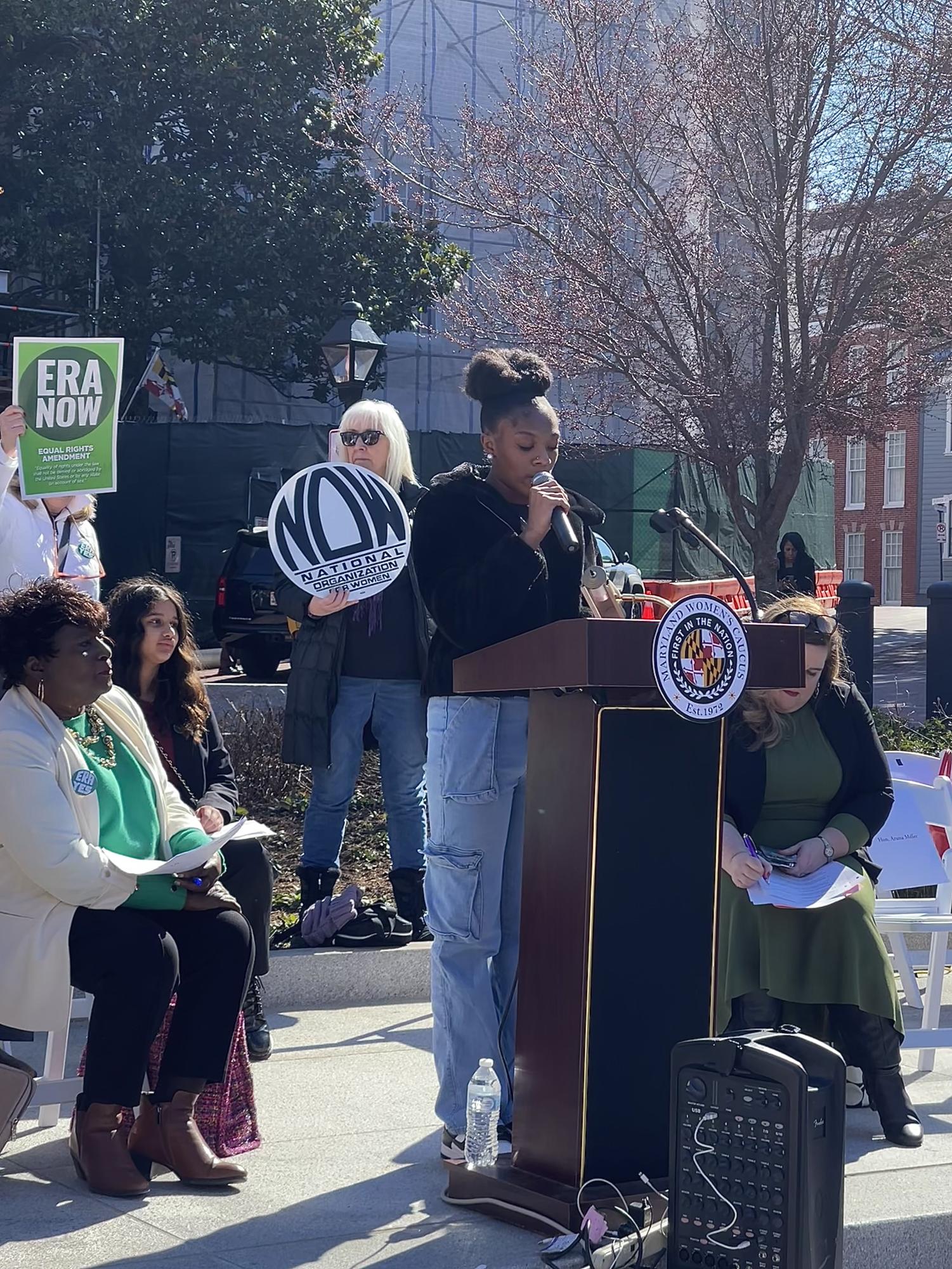
Da’Jah Butler, a senior from Annapolis High School, read her speech at the rally passionately. “Every little girl needs to see, speak to, and be mentored by strong female role models. For too long we have been openly as well as subliminally been told that girls and women are inferior to boys and men. No longer can we wait and sit and watch our country turn back the very right women have been fighting for since the establishment of this great country,” Butler said.
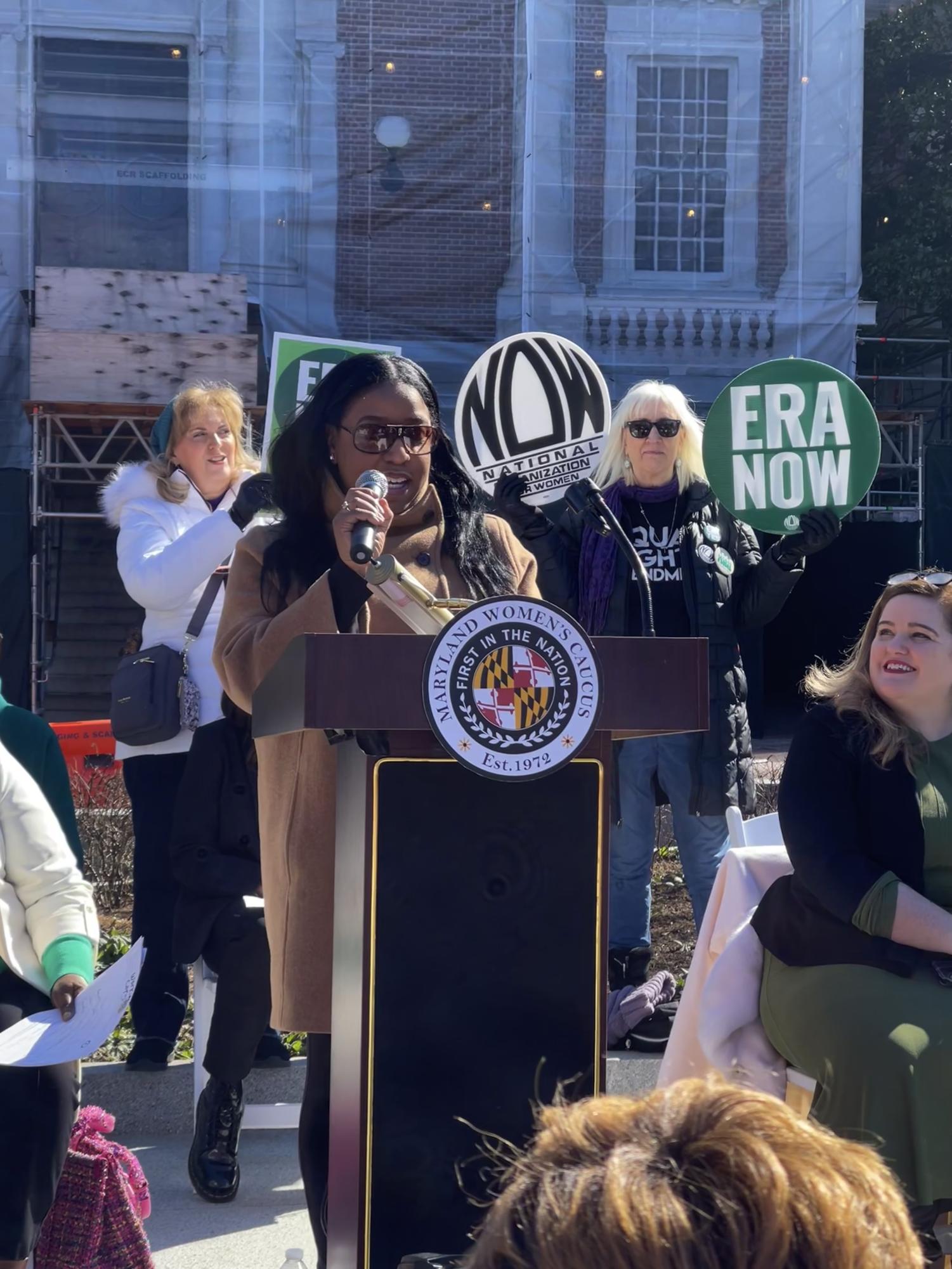
Asha Smith serves as an attorney and human resources professional, and specializes in equal employment opportunity and disability laws. She focuses her speech on the disparity created by the wage gap and abortion bans. “Depending on where a woman today has the misfortune of residing, her state government can direct her the way that one directs a child or an employee, to bear a child. Her health, her desires are irrelevant due to her gender. I’ll tell you what does not have a gender, money. Money doesn’t come in shades of pink and blue, money is green. Women own 40% of small businesses in this country…and employ 12 million people in this country and generate $7 million in revenue,” Smith said. She goes on to question why our country has allowed judges to determine what women are able to do with their own bodies when women contribute so much to it.
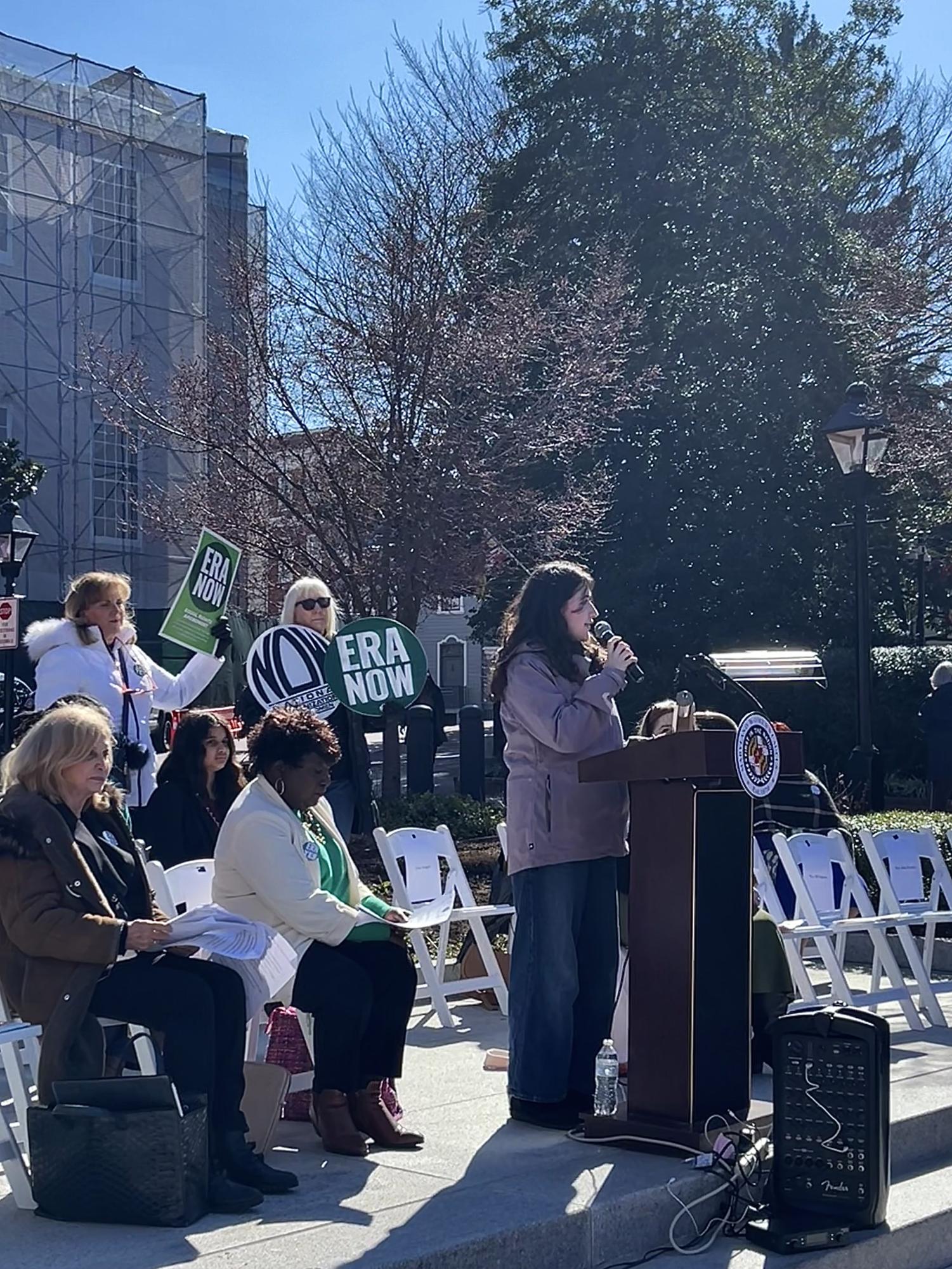
Liliana Katz-Hollander, a junior at Richard Montgomery High School, and the Co-Chair of county organization MOCO EmpowHER, works to support and uplift female and non-binary students in MoCo. “Today, I’d like to talk about my Great Aunt Debbie Chassman. She advocated for the Equal Rights Amendment when she was my age, 50 years ago. I am honored to carry her and so many others’ legacy here today, but I shouldn’t have to. It is unacceptable that our inherent rights are not codified in the Constitution. My mother, who drove me here today, grew up with more legal rights than me,” Katz-Hollander said.
Carolyn Deol, a 13 year old student from Rockville, Maryland, is the founder of “The Yellow Roses”, a foundation dedicated to helping young children understand the significance of the women’s rights movement, and to give them an avenue to advocate for change in their own capacity. The yellow rose is a symbol of the women’s suffrage movement and was often worn to support a woman’s right to vote. She started the project when she was just 10 years old, and has continued to reach out to community members to push for change.
The crowd turns toward a government building in Annapolis with their hands over their hearts as one of the members of the rally performs the Star Spangled Banner.
Your donation will support the student journalists of The Tide, Richard Montgomery High School's student newspaper. Your contribution will allow us to purchase equipment and cover our annual website hosting costs.

